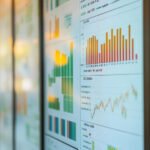Zennemis – Have you ever thought about how data analytics is changing accounting? In this 2nd edition, we’ll see how it’s making financial work better. Data analytics in accounting is key for making decisions with more accuracy and speed.
We’ll share insights from experts like Dr. Vernon J. Richardson and Katie L. Terrell. They teach data analytics at top universities worldwide. Ryan A. Teeter, who has worked with big names like Google and FedEx, will also join us. Together, we’ll show why data-driven methods are crucial for accountants.
We’ll also talk about the CPA Evolution initiative. It shows how accountants need to get better at data analytics. Our aim is to help professionals who want to improve their skills. Let’s start this journey into data analytics in accounting together.
Understanding Data Analytics in Accounting
Data analytics is changing how we handle financial info. Today’s accountants must keep up with these changes. They need to use advanced analysis to get insights from financial data. This helps them check performance and deal with complex rules better.
The Role of Data Analytics in Modern Accounting
Data analytics helps us automate routine tasks and focus on big decisions. Tools like Excel, Tableau, and Power BI make this easier. They let accountants use data to improve financial reports.
Adopting a strong data analytics approach is key. The AMPS Model guides us to ask questions, master data, analyze it, and share findings. This approach boosts critical thinking in various analytics types.
Benefits of Data Analytics for Accountants
Data analytics offers many benefits for accountants. It makes financial reports more accurate. Automated processes cut down on mistakes, showing the real business performance.
It also helps in making better decisions by spotting trends and oddities. This leads to smarter choices. Plus, it’s great for managing risks. By using data analytics, we can spot and plan for risks early.
| Benefits of Data Analytics for Accountants | Description |
|---|---|
| Enhanced Accuracy | Reduces errors in financial reporting through automation. |
| Informed Decision-Making | Provides insights that guide strategic business choices. |
| Improved Risk Management | Facilitates the identification and mitigation of financial risks. |
| Greater Efficiency | Streamlines accounting processes for faster results. |
| Enhanced Compliance | Aids in adhering to regulatory requirements and standards. |
Experts like Dr. Vernon Richardson say data analytics is more than just a plus. It’s a must-have for our field. It gives us the tools to excel in a fast-changing financial world.
Introduction to Data Analytics for Accounting: 2nd Edition
The second edition of *Introduction to Data Analytics for Accounting* offers a deep dive into how data analytics fits into accounting. It was released on July 18, 2023, and covers 382 pages. This makes it a thorough guide for students and professionals wanting to grow their skills in this fast-changing field.
Overview of Key Concepts and Topics Covered
This edition focuses on important concepts for learning data analytics in accounting. We look at different analysis techniques, software tools, and real-world examples crucial for today’s accountants. The authors, Dr. Richardson, Katie Terrell, and Ryan Teeter, share their knowledge from both academia and the industry. They give readers tips on making decisions with data.
The book keeps up with the latest in accounting standards and practices. It includes chapters on data visualization tools, ethical issues, and new technologies in accounting. There’s also a solutions manual to help users practice and improve their understanding.
This textbook is backed by a 100% satisfaction guarantee on study materials. It has a strong reputation, with over 700,000 summaries checked by Stuvia customers and a 4.6-star rating on Google & Trustpilot from more than 1,000 reviews. It’s more than just a learning tool; it’s a key resource for those diving into data analytics for accounting.
Emerging Technologies in Accounting Analytics
Today’s accounting world is changing fast, thanks to new tech in accounting analytics. Innovations like artificial intelligence and machine learning are changing how we look at data. These tools make our work more efficient and give us clearer financial insights.
Trends Shaping the Future of Accounting Technology
New tech is bringing big changes to accounting. Our textbook now covers over 18 new Excel skills for data analytics in different accounting situations. It has nine chapters that show the importance of handling big datasets from real finance scenarios. This helps learners do data analytics projects right.
Importance of Staying Current with Accounting Technology Trends
It’s crucial for accounting pros to keep up with tech trends. We update our resources with new videos and exercises. Every update shows our focus on being precise, making sure our material is current, like Excel 2016. This helps accountants handle today’s complex financial analysis.
| Course Code | Course Title | Credits |
|---|---|---|
| ACCT 203 | Survey of Accounting | 3 |
| ACCT 204 | Honors Survey of Accounting | 3 |
| ACCT 303 | Accounting for Decision Making | 3 |
| ACCT 311 | Managerial and Cost Accounting | 3 |
| ACCT 315 | Personal Financial Planning | 3 |
| ACCT 331 | Intermediate Accounting I | 3 |
| ACCT 332 | Intermediate Accounting II | 3 |
| ACCT 351 | Taxation and Managerial Decision Making | 3 |
| ACCT 361 | Accounting Analytics | 3 |
| ACCT 370 | International Accounting | 3 |
| ACCT 372 | Financial Statement Analysis | 3 |
| ACCT 390 | Introduction to Financial Planning and Wealth Management | 3 |
| ACCT 408 | Taxes Insurance and Risk Management | 3 |
| ACCT 411 | Advanced Managerial Accounting | 3 |
| ACCT 433 | Advanced Financial Accounting | 3 |
Our approach to accounting analytics with technology prepares us for a changing industry. It encourages ongoing learning and adapting. Using these new technologies in accounting analytics sets the stage for success in our work.
Data-Driven Decision Making for Accountants
In today’s fast-changing financial world, accountants need to make decisions based on data. Using data analytics helps us improve our financial analysis and support smart business strategies. Financial analysis software for accountants makes this complex task easier by offering tools for deep evaluations of how well a business is doing.
How Data Analytics Supports Financial Analysis
Data analytics is key in financial analysis. With most enterprise data being unstructured, accountants face a big challenge. We use advanced analytics to turn this data into useful insights. Financial analysis software for accountants helps us spot trends and patterns that guide our decisions.
Utilizing Accounting Data Visualization Tools for Better Insights
Seeing financial data in a visual way helps us understand it better. Accounting data visualization tools like Tableau and Excel make complex data easy to see. These tools are crucial for making our findings clear, helping us share our insights with others. By using good visualization, we can make better decisions that help our clients and our businesses.
| Tool | Purpose | Key Features |
|---|---|---|
| Tableau | Data Visualization | Interactive dashboards, drill-down capabilities |
| Excel | Data Analysis | Formulas, charts, pivot tables |
| Power BI | Business Intelligence | Real-time analytics, custom visuals |
| Alteryx | Data Blending | Predictive analytics, data preparation |
By using these tools, our financial analysis and reporting get much better. Embracing a data-driven approach not only betters our decision-making but also helps us stay ahead in the changing accounting world.
Conclusion: Data Analytics for Accounting
As we wrap up our look at data analytics for accounting 2nd edition, it’s clear that using data analytics is a must. This guide shows us how crucial it is for handling today’s complex accounting tasks with ease and confidence.
By adopting an analytical approach, we can overcome industry hurdles, meet legal standards, and boost our performance. The article’s insights highlight how using data well can improve our decision-making and add value for our stakeholders. The 2nd edition also gives us the tools and strategies to grow our analytical skills and advance in our careers.
We encourage our readers to dive into the world of data analytics in accounting. Staying updated and adapting is vital to fully benefit from data analytics in our work. Let’s work together to embrace this change and build a culture of making decisions based on data in our accounting practices.
FAQ: Data Analytics for Accounting
What is the significance of data analytics in accounting?
Data analytics is key in modern accounting. It makes financial reports more accurate and helps with better decision-making. It also improves risk management by letting accountants analyze complex data for insights.
How does the 2nd edition of “Introduction to Data Analytics for Accounting” contribute to the field?
The 2nd edition is a top resource for accounting pros. It covers data analysis methods, software, and real-world uses. This helps practitioners adopt an analytics mindset and follow current standards.
What emerging technologies are impacting accounting analytics?
Artificial intelligence and machine learning are changing accounting analytics. They make accounting more efficient and accurate. They also require accountants to keep learning to stay ahead.
What are some benefits of data-driven decision-making for accountants?
Data-driven decisions help accountants make better choices. This leads to better performance and following rules. Using tools for analysis and visualization helps them understand complex data better.
How can accountants stay current with technology trends?
Accountants can keep up by taking part in professional development. Attending workshops, webinars, and courses on new tech and analytics is key. This helps them adjust to the changing industry.
What types of financial analysis software are recommended for accountants?
There are many financial analysis software options for accountants. Tools like QuickBooks, Tableau, and Microsoft Excel are popular. They help with analyzing and visualizing financial data, making accountants’ jobs easier.




